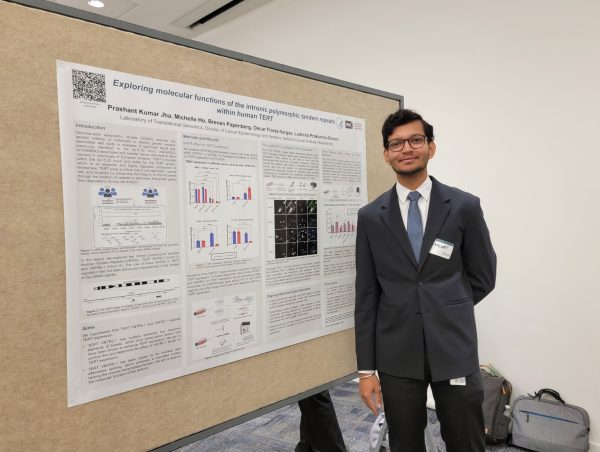Science, research and methodology

Prashant Jha’s dream is to become an medical oncologist. After a lengthy application and interview process, he was one of two undergraduates chosen to work with Ludmila Prokunina-Olsson at the National Cancer Institute last summer.
After 11 weeks of researching the genetics that cause telomerase/telomere mutations in cancer cells, Jha, a senior honors student majoring in biology and minoring in public health and chemistry, is one step closer to achieving his dream. He also works part time as a CNA on the hematology and oncology floor at Carolinas Medical Center.
What did you learn from your internship?
I learned a lot about science, research and research methods.
Research is a lot of trial and error, and I feel like that is something I also got to experience. I had to run one of my experiments eight times to get the results I wanted. I was at the NCI for 11 weeks, and I started the experiment my third week. It kept failing at the end of every week, so I had to keep redoing it at different times, changing different metrics. That was also a very eye opening experience. Everything is not always perfect.
What did you learn about yourself through your internship?
I learned a lot about myself at my internship. This was the first full-time job I have had. Up until then, I worked part time and went to school full time. My internship gave me an understanding of what kind of work-life balance I want. That is a challenge I am still navigating, in all honesty. It was avery competitive program and the people I worked with were mostly master’s students and postdocs. Being with this group of people was eye opening.
What was the best part of your internship?
My favorite part of my internship was presenting the research I conducted. I first presented my work within my department. The people I was presenting in front of understood my work and provided me with feedback and recommendations, which were very valuable.
I also presented to a broader audience at the NCI and the people were very interested in my research. Getting to preset about your work and learning about others work was eye opening. Research is so broad. Every subject, every topic you can think about no matter how well we already know it, there is always more to be learned.
How will you use everything you learned now that you are back on campus?
I am working on my honors thesis and am already applying a lot of the lab skills I leaned over the summer.
Working full-time at NCI changed my thought process. You have to learn how the scientists are actually thinking and then you develop a thought process. That is something I am noticing a lot better. When my professor talks about something, I now have a stronger grasp about what they are talking about. Then I can pose a discussion and it means something.
What are you plans after you graduate next spring?
I want to go to medical school, and it is a very competitive process. My plan is to finish my undergraduate degree and then look into doing clinical research. I want to work for a year before going to medical school.